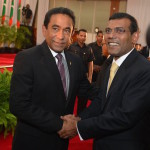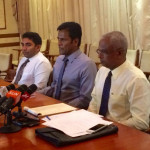The Anti-Corruption Commission (ACC) is said to be investigating allegations that Dhivehi Rayyithunge Party (DRP) Leader Ahmed Thasmeen Ali and Speaker of Parliament Abdulla Shahid may have accepted bribes from the Indian infrastructure company, GMR.
Umar Naseer, a former deputy leader of the DRP until he was dismissed by a disciplinary commission back in December, has confirmed to the press that the ACC had written to him to confirm an investigation into GMR’s deal to manage and redevelop Male’ International Airport had begun.
The investigation will be the second case to be launched this week concerning major deals involving prominent parliamentarians.
Accusations first surfaced last November that Thasmeen and Shahid had each received payments of US$1 million that were claimed to have been supplied by GMR in order for the politicians to try and stall parliament sittings and cross party opposition of its airport plans.
Although unavailable for comment at the time of going to press, both Thasmeen and GMR have previously dismissed the allegations; with the DRP leader saying that the claims – initially appearing on the Dhivehi Post website – were politically motivated and a “fabrication”.
The ACC did not respond to Minivan News when contacted to confirm it had officially opened its second major investigation this week.
However, Umar Naseer said that he was able to supply documentary proof that Thasmeen, Shahid and GMR were being reviewed concerning allegations of corruption. Naseer was also unavailable for comment at the time of going to press.
In late January, the ACC ordered a halt on another government contract, between the Department of Immigration and Malaysian mobile security firm Nexbis, claiming that there were instances where corruption may have occurred.
Facing political pressure ahead of the local council elections, President Mohamed Nasheed upheld the ACC’s request that the roll-out of the technology be postponed.
Nexbis responded that it would be taking legal action against parties in the Maldives, claiming that speculation over corruption was “politically motivated” in nature and had “wrought irreparable damage to Nexbis’ reputation and brand name.”
The week has also seen the ACC ordering Thilafushi Corporation Limited (TCL) to halt the dredging of Thilafushi lagoon, because of issues that “could lead” to corruption in its contract with Heavy Load Maldives.
Heavy Load was awarded the US$21 million project on September 30 last year, and inaugurated the project on February 4.
The Environmental Protection Agency (EPA) also expressed concern over the project, which it claimed had “started work” prior to being issued an Environmental Impact Assessment (EIA).
Heavy Load is a family business interest of ‘Reeko’ Moosa Manik, the ruling Maldivian Democratic Party (MDP)’s parliamentary group leader.
Speaking from Colombo, Moosa told Minivan News on Sunday (February 13) that Heavy Load had spent 2-3 months mobilising resources for the project. The February 4 inauguration attended by President Mohamed Nasheed was symbolic, and did not necessarily mean the company had started dredging work, he said.
As for the ACC’s allegations it was, he said, “not a coincidence” that the announcement had been made a day after allegations broke in the Indian press that People’s Alliance (PA) leader Abdulla Yameen – also former President Maumoon Abdul Gayoom’s half-brother – sold blackmarket oil to the Burmese miliary junta.
“There is a part of the ACC that is not free and fair,” Moosa said, alleging that the commission was subject to misuse for political purposes.
“PA’s Deputy Leader [Ahmed] Nazim is very close with one of the commission members, [Abdulla] Hilmy, which needs closer investigation,” Moosa said.
Despite the nature of the corruption allegations and the ACC alleged concerns over GMR, the infrastructure group took control of the airport in late November. The company claims that it hopes to begin redeveloping the existing airport structure during an initial 180 day period ahead of operating and that it had been completely open in all matters regarding its deal for the airport project.
Andrew Harrison, Chief Executive Officer (CEO) of GMR Male’ International Airport, told Minivan News late last year that any meetings held during consultations, particularly those involving government figures, had been advertised and open to the public.
“We go to public meetings, and we have other stakeholders present in these meetings. So for us, there is no question of anything occurring that would be shrouded in secrecy, or not known to the public,” he said.
“Certainly I can tell you I have no knowledge of anything like that taking place. This seems to be something going on between people outside of GMR, although somehow we have appeared in the frame.”





These thugs wont let anything good happen to this country! they will do what ever they can to stop it. very sad situation.
How can the ACC operate outside the legal framework? Surely, the Constitution cannot give it powers that would allow it to operate outside the judicial framework. That would be un-constitutional!
I'd have thought that the ACC is an investigative body. Just as the Police cannot ask someone to be jailed just because they saw them commit a crime, the ACC cannot make rulings. It has to be the Courts that can rule on ANY matter.
If that's not the case, then we do have a major problem!
In most other countries, a division of the law enforcement agencies undertake cases of corruption. They investigate, gather evidence and bring them to the Courts.
The agencies themselves cannot make any rulings. Is that not applicable to our ACC?
Its not true, this time its not corruption. Its just coincidence.. again.
The ACC must act within its mandate as described in the law. They can investigate but rulings can only be obtained through the courts.
dear Neil, EPA dose not issue a EIA for developer, but rather a decision statement or a permit to start work is given.This permit or DS is given based on the evaluation of EIA report submitted on behalf of the Developer by a registered EIA consultant.